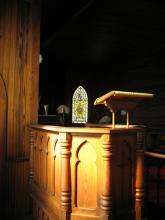petraeus

In an attempt to make sense of the 2012 election and the unfolding David Petraeus sex scandal, I consulted the Bible and the Sayings of the Fathers, a collection of sage rabbinic teachings written between 200 B.C. and 200 A.D.
Turns out the ancient perceptions about politics and ethics are as insightful today as when they were first uttered.
I am appalled when clergy of any religion endorse candidates by name in the run-up to an election. Priests, ministers, rabbis and imams, of course, have every right to vote for any particular person they choose, thanks to the secret ballot. The clergy also have the right — indeed, the obligation — to discuss and debate the critical issues facing society. But religious leaders err and undermine their own authority when they publicly call for the election or defeat of a specific individual.
Last month “Pulpit Freedom Sunday” was sponsored by a group called the Alliance Defending Freedom. Nearly 1,500 Christian ministers openly backed various candidates as they tested the U.S. tax code, which forbids non-profit organizations (including houses of worship) from speaking out for or against political candidates. Such actions endanger their tax-exempt status, but the ADF sees that restriction as an incursion on freedom of religion and speech.